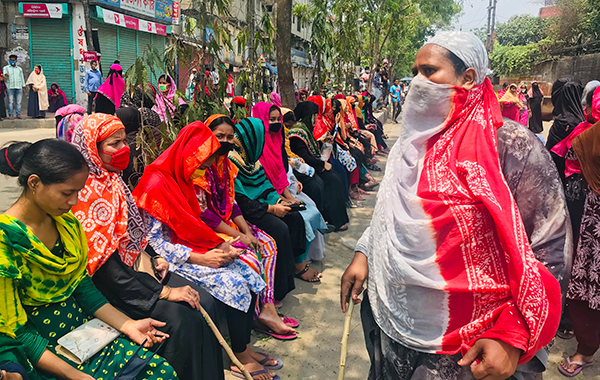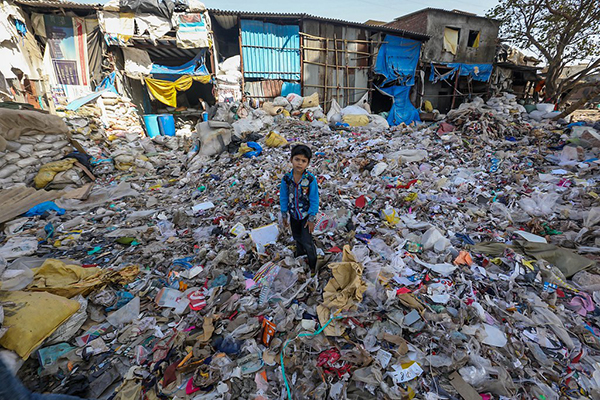From Vise Grip to Death Grip
Imperialist Domination, COVID-19, and the Poor of the World Be Damned
by Raymond Lotta
| revcom.us
As the COVID-19 pandemic spread worldwide, the global economy contracted. As suffering and deaths caused by the virus have mounted across the planet, the world imperialist system, U.S. imperialism in particular, has responded as it always has: acting to maintain the profitable functioning and interests of empire... to even more horrific effect, especially in the oppressed countries.
Four examples from different parts of the “global south” where the great majority of oppressed humanity lives and works:
Exhibit 1. U.S. ambassador issues ultimatum to Mexican government: factories run by U.S. manufacturing corporations must stay the fuck open or we take our jobs elsewhere.
Close to the U.S. border in Mexico, U.S.-owned and subcontracted factories employ hundreds of thousands of Mexican workers. They produce computer, airplane, and car parts, televisions, and other electrical appliances—overwhelmingly for the U.S. market. Wages of workers average one-ninth of manufacturing wages in the U.S.; and labor and environmental protections are minimal.
With outbreaks of the coronavirus erupting in these and other factories, with workers falling ill and dying on the job, and with testing for the virus scarce—the Mexican health ministry ordered plant closings. It was a bare-bones safety measure. But to the U.S. imperialists, this is an intolerable, criminal act. As recounted in the New York Times, it was not because these factories are producing goods or carrying out services essential to the welfare of the Mexican people. Again, most of the output is exported. But that output has been deemed by the U.S. government as “essential” to... the United States! Come again—TVs, Sharpie pens, aircraft engines for a U.S. airline industry that is severely curtailing operations?
A dirty little secret: the profitability of imperialist supply chains* depends on the continuing humming of global assembly lines... the strategic capacities of the U.S. military/death machine and security apparatus requires an assured inflow of components... and the competitive strength of U.S. capital depends on reliable, low-cost/efficient production—the more so with China’s economy re-starting big time, and giving imperialist China a certain competitive leg up in a clobbered world imperialist economy.
And so this threat from the U.S. ambassador in response to the Mexican government’s stated concerns about COVID-19 spreading among workers in these plants: “You don’t have ‘workers’ if you close all the companies and they move elsewhere.” In other words, you (Mexico) reopen, or we (the U.S. with its transnational corporations) could just pull up stakes and leave your economy to crater even more. Which, by the way, is part of the operational logic and extortion of imperialist supply chains. The Mexican factories have remained open.
The New York Times described this ultimatum as an example of America’s “unequal relationship” with Mexico. We can be more precise: brute neocolonialism. And keep this fact in mind: the great majority of the infected in Mexico with COVID-19 are factory workers.1
Exhibit 2. Fast fashion, sweatshops, and COVID-19 in Bangladesh.
Some 4.1 million workers, 85 percent of them women, live and labor in the cramped conditions of the garment industry of Bangladesh. They produce T-shirts, dresses, pants for the likes of Walmart, Target, H&M, and other Western retailers. Industrial accidents, fires, building collapses (more than 1,000 people died in one such collapse in 2013), and sexual abuse are commonplace in these cost-minimizing, life-draining factories. It all goes into your seasonal “fast fashion.”2
Bangladesh’s economy has been twisted and distorted to serve the interests of imperialism: 80 percent of its export earnings derive from the garment industry; it is the driver of economic “growth” in Bangladesh; and the country is highly vulnerable to economic shocks coming from the imperialist countries (like the recession of 2008-09). A sword hangs over the garment industry: if these garment factories do not meet and continue to cheapen prescribed production costs, then Western retailers can subcontract to other suppliers in other poor countries. That’s the pit each-against-each modus operandi of imperialist supply chains. Driving costs down, raising profitability... and it all rests on savage super-exploitation. That’s the norm, before the onset of COVID-19.
With the pandemic hitting hard and retail stores closing in the U.S., Western companies abruptly canceled billion-dollar orders. Much of the garment industry and other manufacturing shut down in Bangladesh. Millions of workers, mostly women from rural areas, were sent home. Nearly all the big-name retailers refused to contribute to the cost of partial wages for furloughed workers, as mandated by Bangladeshi law. Seventy percent of these workers were sent home without pay.3 Many, without knowing, were carrying the coronavirus to their villages.
But the shutdowns were temporary. Rival ownership groupings and garment factories in Cambodia, China, Sri Lanka, and Vietnam (operations that are also part of Western supply chains) had reopened. And if factories in Bangladesh did not find their own ways to restart, orders might be permanently lost. And so the specter of hundreds of thousands of garment workers shuttling back and forth between Dhaka (the capital of Bangladesh where the garment industry is centered) and their rural villages—many traveling by foot. And so the horror, to quote the Economist, of workers “left languishing in slums by the garment factories—now the centers of Bangladesh’s coronavirus outbreak.”
Did I mention that in one of the poorest districts in Dhaka where garment factories are clustered, 150 out of 160 COVID-19 tests conducted in one day proved positive? Did I mention that Bangladesh has a population of 170 million but only some 1,000 intensive-care beds?4
Exhibit 3. Shantytowns caused by imperialism... as transmission belts of COVID-19.
As the curve of new COVID-19 cases begins to flatten in the rich countries, poor nations now represent all of the countries where COVID-19 cases are growing most rapidly.
One of the major reasons is what Bob Avakian has called the “shantytown-ization of the Third World.” This refers to breakneck urbanization in the oppressed countries: and the explosive growth of densely populated and impoverished cities and slums where disease is easily spread.
What accounts for this unprecedented growth of cities and “mega”-cities in the Third World? Imperialist agribusiness and raw-materials investments and land-grabbing in rural areas have devastated subsistence peasant agriculture. Imperialist export-processing zones that produce goods for the wealthy countries entice migrants into the cities. Global warming, caused overwhelmingly by the rich countries’ use of fossil fuels, has turned land previously farmed and grazed into desert. These and other factors have driven and drawn tens of millions upon millions out of rural areas to the cities. But the economies of the oppressed countries are so distorted by imperialism... that they cannot absorb people into regular employment.
As you shelter in place, reflect on this passage from an academic study: “There are 1.2 billion people globally living in informal slums, which by definition are crowded and lack sufficient access to water and sanitation—meaning any force of isolation or quarantine is impossible. In some slums the density is as high as 800,000 people per square mile—for comparison, New York City’s is 27,000.”5 The question is posed: How is social distancing practiced under these awful conditions?
But it’s not only how people are forced to live in the oppressed countries. It’s also how they are compelled to work. The great majority of people in the “global south” work, when they do find work, in what is called the “informal economy.” These are irregular jobs offering little security, payment largely in cash, jobs shielded from workplace regulations, and with no benefits. Most who work in the informal economy have no savings, and need their daily or weekly earnings to feed their families. The question is posed: Do you comply with lockdowns and starve—or defy it to feed your family?
And the governments of the poorest countries have limited budgets to support populations no longer working or in lockdown. As one journalist observed, “[it’s] the worst of both worlds—mass poverty from shutdowns and mass illness and deaths from the continued spread of the virus.”6 That is the current reality for much of the world’s population.
Exhibit 4. It gets worse... the imperialist stranglehold on public health in poor countries.
In 2019, 64 countries, nearly half of them in sub-Saharan Africa, spent more servicing their external debt than on health.7 Debt service is the amount of money—the interest and the principal—spent over a given period to pay down loans from imperialist banks, governments, and other lending institutions like the International Monetary Fund.**
More going out to repay debt than going into domestic public health is a grisly statistic. It has meant that, because of cuts in the health budgets, training, and research in poor countries over the years (as part of satisfying conditions to obtain more loans from imperialist financial institutions), many doctors trained in Africa emigrate to the West. It means, in this time of pandemic, that financial resources that could be going to alleviate some aspects of this crisis are earmarked to repay loans that reinforce the whole structure of imperialist domination of oppressed countries: export-oriented production, raw materials extraction, and infrastructure development serving the needs of imperialist accumulation of profit and more profit. And with the economies of the poor nations now experiencing steep declines, and when billions of additional dollars are needed to cope with this health crisis, this debt-repayment will become an even greater weight on these countries.
Consider these facts:
*Africa has the highest burden of disease in the world, but only three percent of the world’s health workers.8
*At the height of the Ebola outbreak in West Africa, there was an average of two doctors per 100,000 in Sierra Leone, and 45 per 100,000 in Nigeria (Africa’s most populous country)—compared to some 250 doctors per 100,000 in the U.S. at the time.9
*In mid-April of this year, Nigeria, with its population of 200 million, had only 100 ventilators!10
CONCLUSION
All of what has been described reflects the lopsidedness of the world: the concentration of advanced productive forces and technology in the capitalist-imperialist countries. All the “pre-existing conditions” of imperialist domination in the “global south”—the supply-chain sweatshops, the loans that tighten control over and distort the economies of poor countries, the densely populated shantytowns of poverty and disease—have been an unrelieved horror. All this is built into and basic to the fundamental nature and workings of the capitalist imperialist system. With the COVID-19 pandemic, all the suffering has intensified and will intensify further.
As Bob Avakian has put it: “...we have two choices: either, live with all this—and condemn future generations to the same, or worse, if they have a future at all—or, make revolution!”
Explanatory notes
*A supply chain is an integrated network of production units, transport, and distribution forming the process of producing a final commodity, like Nikes, iPhones, or cars. Imperialist capital deploys global supply chains to outsource and subcontract interrelated segments of production (mining of materials, manufacture of parts and components, assembly) to low-wage suppliers in the oppressed nations of the “global south”—and puts continual pressure on these suppliers to cheapen costs, which means more savage exploitation of workers. [back]
**To repay debt, poor countries must generate earnings/revenues, typically by producing and selling goods on the world market, which provides foreign exchange, like the dollar, that is required for repayment. But often, when debt cannot be repaid because of high interest/short-term loans, poor countries must borrow and borrow anew to repay loans, leading to a situation called a “debt trap.” [back]
1. Natalie Kitroeff, “As Workers Fall Ill, U.S. Presses Mexico to Keep American-Owned Plants Open,” New York Times, April 30, 2020 [back]
2. See, Dana Thomas, Fashionopolis: The Price of Fast Fashion and the Future of Clothes (New York: Penguin, 2019). [back]
3. Elizabeth Paton, “‘Our Situation is Apocalyptic’: Bangladesh Garment Workers Face Ruin,” New York Times, March 31, 2020. [back]
4. “Suffering from a stitch—Bangladesh cannot afford to close its garment factories,” The Economist, April 30, 2020. [back]
5. Asif Saleh and Richard A. Cash, “Masks and Handwashing vs. Physical Distancing: Do We Really Have Evidence-based Answers for Policymakers in Resource-limited Settings?,” Center for Global Development, April 3, 2020. [back]
6. Kelsey Piper, “The devastating consequences of coronavirus lockdowns in poor countries,” Vox, April 18, 2020. [back]
7. Jubilee Debt Campaign, “Sixty-four countries spend more on debt payments than health,” April 12, 2020 [back]
8. Robert Nash, et al., “Reflections on family medicine and primary healthcare in sub-Saharan Africa,” BMG Global Health, May 12, 2018. [back]
9. Statista Research Department, “Physician density in West African countries suffering from the 2014 Ebola outbreak,” August 16, 2014. [back]
10. Max Bearak and Danielle Paquette, “Africa’s most vulnerable countries have few ventilators—or none at all,” Washington Post, April 18, 2020 [back]
Would Mexico & Central America still be the US' backyard after the revolution?
From a Q&A following the speech by Bob Avakian:
Why We Need An Actual Revolution and How We Can Really Make Revolution
Watch BA’s whole speech
Watch clips from the speech

The maquiladora owned by the TECMA group in Ciudad Juarez was the center of a major COVID-19 outbreak. Thirteen employees at the factory have died of the disease, according to Mexican health officials. (Photo: Wikipedia)

BAsics, from the talks and writings of Bob Avakian is a book of quotations and short essays that speaks powerfully to questions of revolution and human emancipation.
“You can't change the world if you don't know the BAsics.”

Bangladeshi garment workers block a road demanding their unpaid wages during a protest in Dhaka, Bangladesh, April 16. More than a million of the 4.1 million workers in Bangladesh’s garment industry have been furloughed or fired due to cancelled orders. (Photo: AP)


Piles of garbage in Dharavi, India.
Get a free email subscription to revcom.us:

